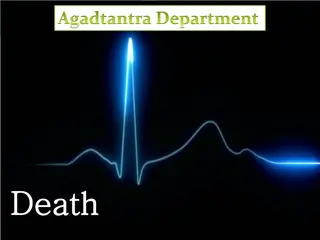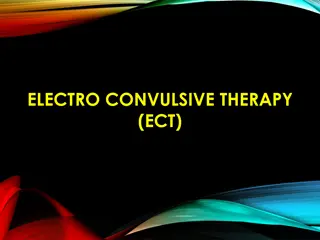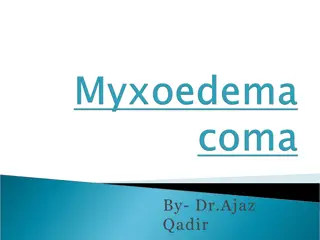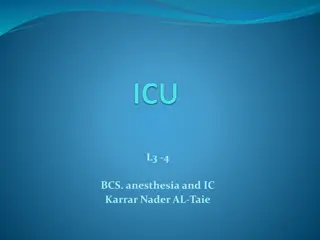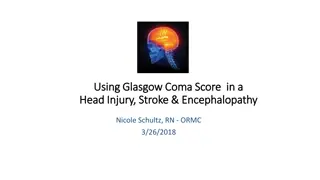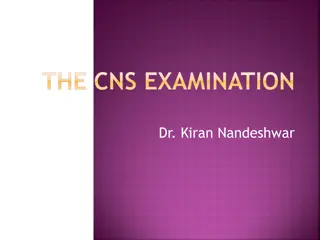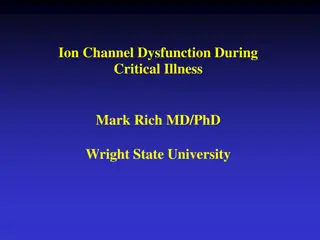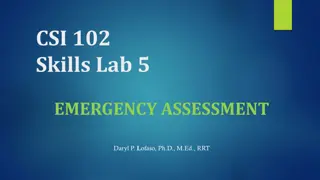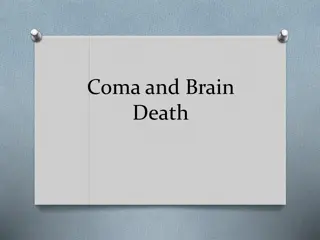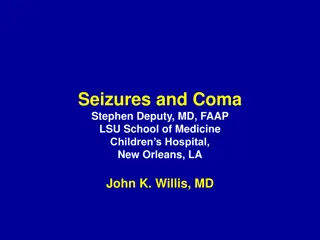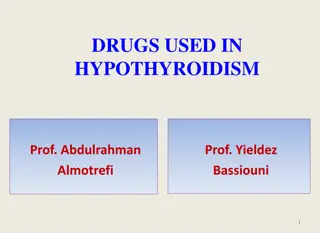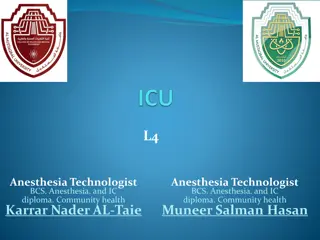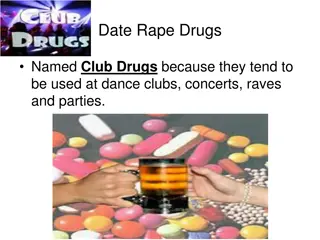Agadtantra Department
Death is defined as the irreversible cessation of life, marked by the stoppage of vital organ functions. The diagnosis of death includes clinical criteria like absence of pulse and respiration. Stages of death encompass somatic and molecular death, each with distinct characteristics. Different modes
1 views • 35 slides
Understanding Electroconvulsive Therapy (ECT) for Psychiatric Treatment
Electroconvulsive Therapy (ECT), also known as electroshock, is a psychiatric treatment that induces seizures in anesthetized patients for therapeutic purposes. ECT has a controversial history but is well-established in the medical field. Introduced in 1938, ECT has replaced older treatments like in
1 views • 17 slides
Understanding Myxedema Coma: Symptoms, Diagnosis, and Management
Myxedema coma is a rare, life-threatening condition associated with decompensated hypothyroidism. It presents with altered mental status, low body temperature, and various metabolic abnormalities. This article explores the primary symptoms, differential diagnosis, and management of myxedema coma bas
0 views • 20 slides
BCS. anesthesia and IC
The Glasgow Coma Scale (GCS) is a vital tool for healthcare professionals to assess a patient's level of consciousness, commonly used in head trauma and other non-trauma settings. It consists of three aspects: eye opening response, verbal response, and motor response, with scores ranging from 3 to 1
0 views • 17 slides
Understanding Glasgow Coma Score in Head Injury, Stroke & Encephalopathy
A 61-year-old female with intractable headache and eye pain was admitted for sepsis secondary to herpes zoster, leading to encephalopathy and CO2 Narcosis. Through accurate Glasgow Coma Score (GCS) documentation, the Severity of Illness (SOI) and Risk of Mortality (ROM) were improved. Coding guideli
0 views • 7 slides
Comprehensive CNS Examination Guidelines by Dr. Kiran Nandeshwar
Detailed guidelines for performing a thorough examination of the central nervous system (CNS) covering general examination, higher function assessment, Glasgow Coma Scale, cranial nerves examination, and motor system evaluation. Includes visual aids for each aspect of the examination process.
0 views • 24 slides
Understanding Ion Channel Dysfunction in Critical Illness
An intriguing case study presents a young male with weakness and coma in the ICU following pneumonia and sepsis. Nerve conduction results indicated critical illness myopathy and polyneuropathy, along with cardiac abnormalities. Reduced muscle excitability was attributed to a sodium channelopathy. Th
0 views • 14 slides
Emergency Assessment Guide for Medical Professionals
Comprehensive emergency assessment guide covering primary and secondary assessments, triage classification, and differentiation of emergent, urgent, and non-urgent medical conditions. Includes initial assessment steps, Glasgow Coma Scale evaluation, and key interventions for life-threatening situati
0 views • 17 slides
Understanding Coma, Brain Death, and the Examination Process
Exploring the definitions of coma and altered consciousness, understanding brain death examinations, criteria for determining brain death, who can perform the exam, Texas law on the definition of death, and components of a brain death exam. Learn about different states of altered consciousness, the
0 views • 14 slides
Understanding Seizures and Coma: A Comprehensive Overview
This informational content delves into various aspects of seizures and comas, covering topics such as the prevalence of seizures, classification of epilepsy, EEG in epilepsy, seizure history, and different types of seizures like simple partial and complex partial seizures. It provides insights into
0 views • 69 slides
Drugs Used in Hypothyroidism and Their Effects
Hypothyroidism is characterized by an underactive thyroid gland, leading to a variety of symptoms. This detailed presentation covers the causes, manifestations, and treatments of hypothyroidism, with a focus on the drugs used for treatment. Learn about different classes of medications, their mechani
0 views • 20 slides
Understanding the Glasgow Coma Scale (GCS) in Healthcare
The Glasgow Coma Scale (GCS) is a critical tool for assessing the level of consciousness in patients, commonly used in head trauma cases but applicable across various medical settings. The GCS evaluates eye opening, verbal response, and motor responsiveness, assigning scores to each aspect to determ
0 views • 17 slides
Understanding Date Rape Drugs: Rohypnol and GHB
Date rape drugs, often referred to as club drugs, are commonly used at dance clubs, concerts, raves, and parties. Rohypnol, also known as Roofies, is a depressant drug prescribed in Europe for sleep and pre-surgery relaxation. It is orally taken in various colored pills, such as olive green or white
0 views • 38 slides
